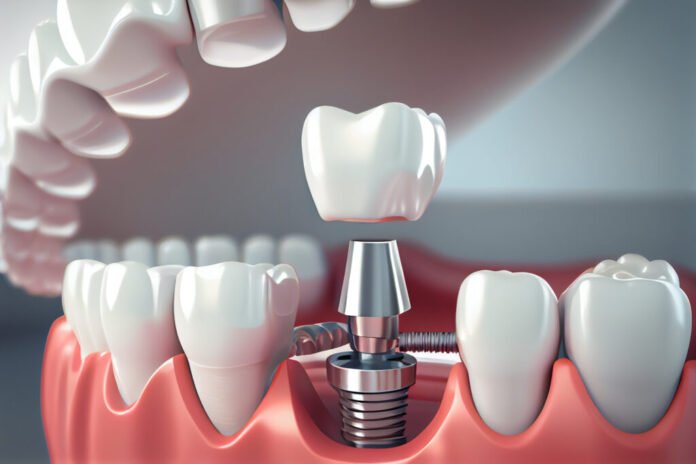If you’re considering options for replacing missing or damaged teeth, dental implants offer a reliable solution with numerous benefits. Dental implants are artificial structures that are securely anchored into your jawbone to simulate the root of a tooth, providing a strong foundation for fixed or removable replacement teeth designed to match your natural teeth. Here’s an overview to help you determine if dental implants are the right choice for you.
Understanding Dental Implants
Components of Dental Implants:
- Implant: A titanium screw that acts as a root for the new teeth. This part integrates with the jawbone in a process called osseointegration.
- Abutment: A connector built on top of the implant; it supports and holds the crown.
- Crown (Prosthesis): The visible part that looks like a natural tooth, usually made of ceramic or porcelain for durability and aesthetic appeal.
Advantages of Dental Implants:
- Natural Look and Feel: Implants are designed to look, feel, and function like your natural teeth. They integrate into the structure of your bone, preventing the bone loss and gum recession that often accompany bridgework and dentures.
- Improved Speech and Comfort: Unlike dentures, which can cause mumbling or slipping, implants stay firmly in place.
- Eating with Ease: Dental implants allow you to chew your food thoroughly without discomfort. Unlike removable dentures that can shift while eating, implants provide stability.
- Durability: When properly installed and cared for, dental implants can last a lifetime, making them an excellent investment.
- Oral Health Benefits: Implants don’t require altering adjacent teeth, thus preserving more of your natural tooth structure. They also help prevent bone loss and support facial structure.
Are You a Candidate for Dental Implants?
To determine if you are a good candidate for dental implants, consider the following criteria:
- Healthy Oral Tissues: Adequate bone in your jaw is needed to support the implant, and healthy gums are essential for keeping implants in place.
- Non-Smokers: Smoking can weaken bone structure and can contribute to implant failures.
- Good Overall Health: Chronic disorders, such as diabetes or leukemia, may interfere with healing after surgery.
- Commitment to Care: Regular dental visits and good oral hygiene are crucial for the long-term success of dental implants.
The Procedure
- Initial Evaluation: Includes exams, X-rays, and impressions of your mouth.
- Implant Placement: The implant is surgically embedded into the jawbone.
- Healing Process: Healing time varies, during which the implant integrates with the jawbone.
- Abutment Placement: This step may occur along with the implant or after healing.
- Artificial Tooth Placement: Once your gums heal, the new teeth are created and fitted.
Conclusion
Dental implants are a proven solution for tooth loss, providing a functional replacement that can significantly enhance your quality of life. They offer both physical and psychological benefits, including improved appearance and self-esteem. However, they require a significant investment in time and resources, as well as a commitment to maintaining oral health. If you meet the criteria for candidacy and are looking for a permanent solution to tooth loss, dental implants could be the right choice for you. Consider consulting with a dental specialist who can provide a personalized assessment and treatment plan tailored to your needs.
